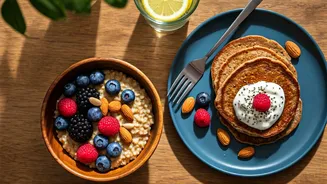Fiber's Digestive Power
Fruits are often a good source of dietary fiber, an essential component for digestive health. Fiber functions in two primary forms, both critical for optimal
gut performance. Insoluble fiber, like that found in the skins of many fruits, contributes bulk to the stool, aiding in the regular movement of waste through the digestive tract. This can prevent constipation and promote healthy bowel movements. Soluble fiber, prevalent in fruits like apples and citrus fruits, dissolves in water and forms a gel-like substance. This gel slows down digestion, which can help regulate blood sugar levels and also binds with cholesterol in the digestive system, reducing its absorption. The combination of both types of fiber ensures a balanced digestive system and contributes to overall wellness. Furthermore, fiber helps in the development of a healthy gut microbiome, which contains beneficial bacteria that aids in the digestion of food.
Apples: Gut's Best Friend
Apples, a widely available and favored fruit, contain both soluble and insoluble fiber, rendering them a powerhouse for digestive wellness. The soluble fiber in apples, mainly in the form of pectin, transforms into a gel-like consistency when it interacts with water within the digestive system. This slows down digestion, regulating blood sugar spikes and helping to keep cholesterol under control. Moreover, apples act as a prebiotic, fostering the growth of healthy bacteria within the gut. This prebiotic action is crucial for maintaining a balanced gut microbiome, essential for efficient digestion and overall health. Consuming an apple daily can support regular bowel movements due to its high fiber content. Eating apples whole, including the skin, maximizes the intake of fiber, offering the most advantages for digestive health and general wellness.
Bananas: Steady Digestion
Bananas are recognized for their high potassium content and can also be incredibly beneficial for digestive health. They are gentle on the stomach, making them a suitable choice for individuals with sensitive digestive systems. Unripe bananas have high amounts of resistant starch, which passes through the digestive tract undigested and functions as a prebiotic, promoting the growth of beneficial gut bacteria. Ripe bananas offer easily digestible carbohydrates that offer instant energy without overloading the digestive system. Bananas also contain pectin, a form of soluble fiber that facilitates smoother digestion and aids in the movement of food through the digestive tract. Whether eaten as a snack or integrated into a meal, bananas provide sustained energy and support digestive wellness, contributing to overall good health. They are also easily accessible and convenient, making them an excellent dietary choice.
Papaya: Enzyme Powerhouse
Papaya, with its tropical flavor and vibrant color, is filled with enzymes that aid in the digestion of food, specifically papain. Papain is a protease enzyme that breaks down proteins, improving digestion and alleviating symptoms like bloating and indigestion. The consumption of papaya can therefore assist the body in processing proteins more effectively, reducing the strain on the digestive system. Besides papain, papaya is a good source of fiber, assisting in regular bowel movements. The high water content of papaya also contributes to healthy digestion by preventing constipation. It is also rich in antioxidants and vitamins, which provide added health benefits. Including papaya in your regular diet supports not only digestive wellness but also offers a range of health-boosting advantages, making it a valuable addition to any balanced diet.
Kiwi: Gut Movement
Kiwi, a nutrient-dense fruit, is recognized for its significant positive effects on the digestive system. Kiwis are particularly rich in fiber, both soluble and insoluble, which promotes regular bowel movements and helps to prevent constipation. The fiber bulks up the stool, making it easier to pass through the intestines. Moreover, kiwis contain actinidin, an enzyme that aids in the breakdown of proteins, which improves digestion and reduces bloating. Scientific research supports the advantages of kiwi for digestive wellness. Studies have indicated that consuming kiwi can lead to increased stool frequency and improved gut transit time, making the digestive process more efficient. Because of these properties, kiwis are a valuable addition to a healthy diet for those wishing to enhance their digestive function and sustain general well-being.
Berries: Antioxidant Boost
Berries, encompassing blueberries, strawberries, raspberries, and others, are packed with antioxidants and fiber, both crucial for digestive wellness. The high fiber content in berries supports regular bowel movements and contributes to the prevention of constipation. Fiber adds bulk to the stool, aiding in its passage through the intestines. The antioxidants in berries protect the cells in the digestive tract from damage, contributing to overall health. Berries also contain natural sugars, which are balanced by the fiber, preventing significant blood sugar spikes. The consumption of berries has been connected to a decrease in inflammation within the digestive system, contributing to better digestion and decreased discomfort. Integrating berries into a daily diet provides not only digestive benefits but also enhances general health by offering vitamins, minerals, and antioxidants.
Pears: Fiber-Rich Choice
Pears are a fantastic source of both soluble and insoluble fiber, making them excellent for digestive health. The fiber found in pears assists in regulating bowel movements, preventing constipation, and promoting a healthy digestive system. Pears also include pectin, a type of soluble fiber that can help lower cholesterol levels and regulate blood sugar. This fiber forms a gel in the digestive system, which helps to slow down the digestion of food. Pears are not only beneficial for digestion; they are also a great source of vitamins and minerals, contributing to overall health. Including pears in your diet provides a delicious and healthy option, aiding in digestive health and supporting a balanced lifestyle. They are a simple and accessible way to boost your fiber intake and boost your digestive wellness.
Citrus: Digestive Aid
Citrus fruits, like oranges, grapefruits, and lemons, provide numerous digestive benefits owing to their high fiber and water content. The fiber in citrus fruits supports regular bowel movements, avoiding constipation and maintaining digestive health. The natural citric acid present in these fruits can help to stimulate digestive juices, improving the breakdown of food. Citrus fruits are also a good source of vitamin C, which strengthens the immune system and assists in overall health. Consuming citrus fruits regularly aids in digestion and promotes a healthy digestive system. They are an easy and refreshing way to include more fiber and essential nutrients into your diet. Moreover, their high water content helps to hydrate the body, which is also important for good digestion.
Pineapple: Bromelain Benefits
Pineapple contains bromelain, a special enzyme that is highly effective in enhancing digestion and lowering inflammation. Bromelain breaks down proteins, easing digestion and minimizing bloating and discomfort. This enzyme is particularly beneficial for those suffering from digestive issues like irritable bowel syndrome (IBS). Furthermore, pineapple has a good amount of fiber, both soluble and insoluble, which supports regular bowel movements and helps prevent constipation. The fiber adds bulk to the stool, facilitating its passage through the digestive tract. The high water content of pineapple also supports a healthy digestive system by helping to keep things moving smoothly. Eating pineapple regularly not only aids digestion but also provides a good source of vitamins and minerals, promoting general health and well-being.
Figs: Natural Laxative
Figs are a powerful natural remedy for digestive concerns, particularly constipation, because of their high fiber content. Both soluble and insoluble fiber are abundant in figs, providing comprehensive digestive support. The fiber in figs helps to add bulk to the stool, assisting in its smooth passage through the intestines, hence avoiding constipation. Furthermore, figs have a gentle laxative effect due to their natural sugars, which can assist in stimulating bowel movements. Eating figs can help to alleviate bloating and other digestive discomforts. Figs also contain prebiotics, which nourish beneficial bacteria in the gut, promoting a balanced gut microbiome. Consuming figs as part of a regular diet is an excellent way to enhance digestive health, promoting regularity and providing a variety of vital nutrients. They are a convenient and delicious approach to enhance your gut health.












